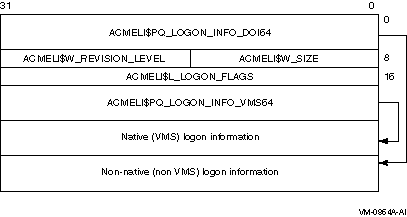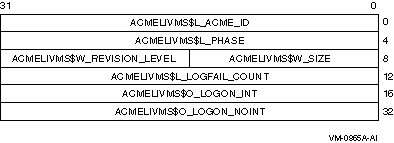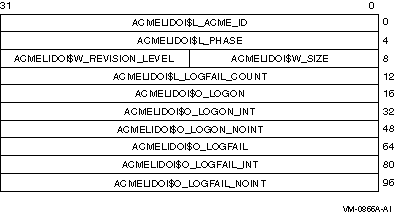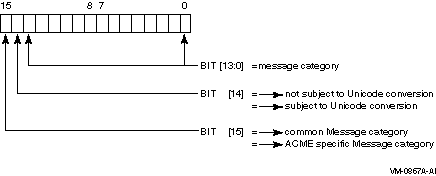HP OpenVMS Systems Documentation |
HP OpenVMS System Services Reference Manual
On Alpha and I64 platforms, both 32- and 64-bit item lists can be chained together. ACME$_CHALLENGE_DATAThe ACME$_CHALLENGE_DATA item code is an input item code. It specifies the challenge data that was used as the basis for generating the response data specified by the ACME$_RESPONSE_DATA item code. The meaning of this data is specific to the domain of interpretation for which it is used.If this item code is specified, the ACME$_AUTH_MECHANISM and ACME$_RESPONSE_DATA item codes must also be specified. (The VMS domain of interpretation does not support this mechanism type.) ACME$_CONTEXT_ACME_IDThe ACME$_CONTEXT_ACME_ID item code is an input item code. It establishes the ACME agent context within which ACME-specific item codes are interpreted. This item code has an effect on the parsing of the list of ACME-specific item codes, and takes effect immediately. It is in effect until the next instance of code ACME$_CONTEXT_ACME_ID, code ACME$_CONTEXT_ACME_NAME, code ACME$_TARGET_DOI_ID, or code ACME$_TARGET_DOI_NAME. The buffer must contain a longword value specifying the agent ID of an ACME agent.ACME$_CONTEXT_ACME_NAMEThe ACME$_CONTEXT_ACME_NAME item code is an input item code. It establishes the ACME agent context within which ACME-specific item codes are interpreted. This item code has an effect on the parsing of the list of ACME-specific item codes, and takes effect immediately. It is in effect until the next instance of code ACME$_CONTEXT_ACME_ID, code ACME$_CONTEXT_ACME_NAME, code ACME_TARGET_DOI_ID, or code ACME$_TARGET_DOI_NAME. The buffer must contain the case-insensitive name string of an ACME agent.ACME$_CREDENTIALS_NAMEThe ACME$_CREDENTIALS_NAME item code is an input item code. It specifies the name of the persona extension holding the set of credentials upon which to operate. The buffer must contain the case-insensitive name string of a persona extension that has been registered on the system.ACME$_CREDENTIALS_TYPEThe ACME$_CREDENTIALS_TYPE item code is an input item code. It specifies the extension ID of the persona extension holding the set of credentials upon which to operate. The buffer must contain a longword value specifying the extension ID of a persona extension that has been registered on the system.ACME$_DIALOGUE_SUPPORTThe ACME$_DIALOGUE_SUPPORT item code is an input item code. It specifies which dialogue mode features are supported by the caller. The buffer must contain a longword bit vector of applicable flags.The $ACMEDEF macros defines the following symbols for the valid flags: ACMEDLOGFLG$V_INPUT---character string input/output capabilities These are the same as those for the ACMEIS$L_FLAGS field on an item set entry. See the description of the context argument for further information. Specify the ACME$_DIALOGUE_SUPPORT item code to indicate the interactive capabilities of the user interface. If the caller is unable to support features necessary to complete a given request, the request ultimately fails. The caller receives a condition value ACME$_INSFDIALSUPPORT for insufficient dialogue support. ACME$_EVENT_DATA_INThe ACME$_EVENT_DATA_IN item code is an input item code. It specifies the buffer containing information applicable to an event operation.The meaning of this data is specific to the domain of interpretation for which it is used. ACME$_EVENT_DATA_OUTThe ACME$_EVENT_DATA_OUT item code is an output item code. It specifies the buffer to receive information returned from an event operation.The meaning of this data is specific to the domain of interpretation for which it is used. ACME$_EVENT_TYPEThe ACME$_EVENT_TYPE item code is an input item code. It specifies the type of event being reported. The buffer must contain a longword value. Interpretation of the value is specific to the domain of interpretation to which the event is being reported.ACME$_LOCALEThe ACME$_LOCALE item code is an input item code. It specifies the collection of data and rules applicable to a language and culture. The buffer must contain a name string that reflects a locale supported by the system.The buffer must contain a string in the following case-insensitive syntax: language-country
language is a 2-letter language code (ISO 639)
The default is EN-US, and cannot be overridden by the specified locale. Locale information may be interpreted by ACME agents to determine country and language requirements. ACME$_LOGON_INFORMATIONThe ACME$_LOGON_INFORMATION item code is an output item code. It specifies the buffer to receive an ACM logon information structure, which contains statistics pertaining to the authenticated principal name within the contexts of the authenticating and native (VMS) domains of interpretation.The size of the buffer must be sufficient to handle data from whatever VMS versions are used, as described in the ACME$_LOGON_INFORMATION structure found in the OpenVMS Programming Concepts Manual. The following diagram depicts the overall format of an ACM logon information structure: 
The following table defines the ACM logon information structure header fields:
The following diagram depicts the format of the ACM logon structure segment containing information about the VMS domain of interpretation: 
The following table defines the fields for the ACM logon structure segment containing logon information about the native (VMS) domain of interpretation:
The following diagram depicts the format of the ACM logon structure segment containing information about the authenticating domain of interpretation: 
The following table defines the fields for the ACM logon structure segment containing logon information about the authenticating domain of interpretation:
ACME$_LOGON_TYPEThe ACME$_LOGON_TYPE item code is an input item code. It specifies the type of logon being performed. The buffer must contain a longword value specifying a valid type. If not specified, the value defaults to the logon type of the calling process.The $ACMEDEF macro defines the following symbols for the valid logon types: ACME$K_DIALUP The values ACME$K_BATCH and zero (0) for batch and detached processes, respectively, are reserved to LOGINOUT.EXE. If either of these values is defaulted or specified by non-LOGINOUT clients, the service returns ACME$_INVREQUEST. ACME$_MAPPED_VMS_USERNAMEThe ACME$_MAPPED_VMS_USERNAME item code is an output item code. It specifies the buffer to receive the name of the local OpenVMS user name to which the principal name was mapped.The maximum data returned for this item code is the number of characters represented by the symbol, ACMEVMS$S_MAX_VMS_USERNAME, so a caller's buffer should be at least that long, with the number of bytes allocated dependent on whether the ACME$M_UCS2_4 function code modifier was specified on the call to $ACM[W]. ACME$_MAPPING_ACME_IDThe ACME$_MAPPING_ACME_ID item code is an output item code. It specifies the buffer to receive the agent ID of the ACME agent that successfully mapped the principal name to an OpenVMS user name. The buffer descriptor must specify a longword.ACME$_MAPPING_ACME_NAMEThe ACME$_MAPPING_ACME_NAME item code is an output item code. It specifies the buffer to receive the name of the ACME agent that successfully mapped the principal name to an OpenVMS user name.Data returned for this item code is the number of characters represented by the symbol, ACME$K_MAXCHAR_DOI_NAME, so a caller's buffer should be at least that long, with the number of bytes allocated dependent on whether the ACME$M_UCS2_4 function code modifier was specified on the call to $ACM[W]. ACME$_NEW_PASSWORD_1The ACME$_NEW_PASSWORD_1 item code is an input item code. It specifies the new primary password for a password change operation. The buffer must contain a password string. The case of this string will be preserved in delivery to ACME agents. Each ACME agent has its own policy regarding whether password strings are treated in a case sensitive or a case-insensitive manner.This item code might be requested in a dialogue step. ACME$_NEW_PASSWORD_2The ACME$_NEW_PASSWORD_2 item code is an input item code. It specifies the new secondary password for a password change operation. The buffer must contain a password string. The case of this string will be preserved in delivery to ACME agents. Each ACME agent has its own policy regarding whether password strings are treated in a case sensitive or a case-insensitive manner.This item code might be requested in a dialogue step. ACME$_NEW_PASSWORD_FLAGSThe ACME$_NEW_PASSWORD_FLAGS item code is an input item code. It requests which passwords should be explicitly updated. The buffer must contain a longword bit vector of applicable flags.The $ACMEDEF macros defines the following symbols for the valid flags: ACMEPWDFLG$V_SYSTEM ACME$_NEW_PASSWORD_SYSTEMThe ACME$_NEW_PASSWORD_SYSTEM item code is an input item code. It specifies the new system password for a password change operation. The buffer must contain a case-insensitive password string.This item code might be requested in a dialogue step. ACME$_NULLThe ACME$_NULL item code indicates that the current item list entry should be ignored.ACME$_PASSWORD_1The ACME$_PASSWORD_1 item code is an input item code. It specifies the primary password applicable to the requested operation. The buffer must contain a password string. The case of this string will be preserved in delivery to ACME agents. Each ACME agent has its own policy regarding whether password strings are treated in a case sensitive or a case-insensitive manner.This item code might be requested in a dialogue step. ACME$_PASSWORD_2The ACME$_PASSWORD_2 item code is an input item code. It specifies the secondary password applicable to the requested operation. The buffer must contain a password string. The case of this string will be preserved in delivery to ACME agents. Each ACME agent has its own policy regarding whether password strings are treated in a case sensitive or a case-insensitive manner.This item code might be requested in a dialogue step. ACME$_PASSWORD_SYSTEMThe ACME$_PASSWORD_SYSTEM item code is an input item code. It specifies the system password applicable to the requested operation. The buffer must contain a case-insensitive password string.This item code might be requested in a dialogue step. ACME$_PERSONA_HANDLE_INThe ACME$_PERSONA_HANDLE_IN item code is an input item code. It specifies the persona to use as the basis for credential acquisition processing. The buffer must contain a longword value specifying a persona ID of an existing persona.ACME$_PERSONA_HANDLE_OUTThe ACME$_PERSONA_HANDLE_OUT item code is an output item code. It specifies a buffer to receive the persona ID of the persona created or acted upon by credential acquisition processing. The buffer descriptor must specify a longword.If no ACME$_PERSONA_HANDLE_OUT item is specified but function modifier ACME$M_ACQUIRE_CREDENTIALS is specified, a persona that is created can be located with the $PERSONA_FIND system service. ACME$_PHASE_TRANSITIONThe ACME$_PHASE_TRANSITION is used by LOGINOUT to convey synchronization information to the VMS ACME for support of backward compatible interfaces for LGI-callouts and DECwindows login.Use of this item code is reserved to HP. ACME$_PRINCIPAL_NAME_INThe ACME$_PRINCIPAL_NAME_IN item code is an input item code. It specifies the name of the entity that is subject to authentication within the domain of interpretation to which it belongs. The buffer must contain a name string.This item code might be requested in a dialogue step. ACME$_PRINCIPAL_NAME_OUTThe ACME$_PRINCIPAL_NAME_OUT item code is an output item code. It specifies the buffer to receive the name of the entity that was authenticated by the authenticating domain of interpretation. This item code is useful when the principal name is not explicitly provided, such as during autologon style processing during which an ACME agent provides the principal name.The maximum data returned for this item code is the number of characters represented by the symbol, ACME$K_MAXCHAR_PRINCIPAL_NAME, so a caller's buffer should be at least that long, with the number of bytes allocated dependent on whether the ACME$M_UCS2_4 function code modifier was specified on the call to $ACM[W]. ACME$_QUERY_DATAThe ACME$_QUERY_DATA item code is an output item code. It specifies the buffer to receive the data returned from the query operation relating to the corresponding ACME$_QUERY_TYPE item code.The ACME$_QUERY_DATA item code requires that an ACME$_QUERY_TYPE item code immediately precede it in the item list. ACME$_QUERY_KEY_TYPEThe ACME$_QUERY_KEY_TYPE item code is an input item code. It specifies the key type for establishing the context of a query operation. The key format is specific to the ACME agent to which the call is directed.An ACME$_QUERY_KEY_TYPE item requires an ACME$_QUERY_KEY_VALUE item immediately following it in the item list. ACME$_QUERY_KEY_VALUEThe ACME$_QUERY_KEY_VALUE item code is an input item code. It specifies the key data for establishing the context of a query operation.An ACME$_QUERY_KEY_VALUE item requires that an ACME$_QUERY_KEY_TYPE item immediately precede it in the item list. ACME$_QUERY_TYPEThe ACME$_QUERY_TYPE item code is an input item code. It specifies the data to be returned in the buffer described by the corresponding ACME$_QUERY_DATA item code.The ACME$_QUERY_TYPE item code requires that an ACME$_QUERY_DATA item code immediately follow it in the item list. ACME$_REMOTE_HOST_ADDRESSThe ACME$_REMOTE_HOST_ADDRESS item code is an input item code. It specifies the network address of the system from which the request originated. The buffer must contain a network address using the representation consistent with ACME$_REMOTE_HOST_ADDRESS_TYPE item code is specified.ACME$_REMOTE_HOST_ADDRESS_TYPEThe ACME$_REMOTE_HOST_ADDRESS_TYPE item code is an input item code that specifies the representation of the ACME$_REMOTE_HOST_ADDRESS item code. The buffer must contain a longword value specifying the address type.The $ACMEDEF macro defines the following symbols for the standard address types:
ACME$_REMOTE_HOST_FULLNAMEThe ACME$_REMOTE_HOST_FULLNAME item code is an input item code. It specifies the fully expanded name of the remote system from which the request originated. The buffer must contain a name string.ACME$_REMOTE_HOST_NAMEThe ACME$_REMOTE_HOST_NAME item code is an input item code. It specifies the name of the remote system from which the request originated. The buffer must contain a name string.ACME$_REMOTE_USERNAMEThe ACME$_REMOTE_USERNAME item code is an input item code. It specifies the name of the remote user on whose behalf the request is being initiated. The buffer must contain a name string.ACME$_RESPONSE_DATAThe ACME$_RESPONSE_DATA item code is an input item code. It specifies the response data that was calculated using the challenge data.Interpretation of this data is specific to a domain of interpretation. This item code may be requested in a dialogue step. ACME$_SERVER_NAME_INSpecifies the Event Server to which an Event should be directed. The meaning of this item is specific to the target domain of interpretation.ACME$_SERVER_NAME_OUTReports the Event Server to which an Event was directed. The meaning of this item is specific to the target domain of interpretation.ACME$_SERVICE_NAMEIndicates the client program making the call to $ACM. The buffer must contain the case-insensitive service name string. The default value is the current image name if the client program is an installed image.Names beginning with x- are reserved for local use. ACME$_TARGET_DOI_IDEstablishes the domain of interpretation within which nonquery operations are performed and the context within which ACME-specific items codes are interpreted.This item code also has an effect on the parsing of the list of ACME-specific item codes and takes effect immediately. It is in effect until the next instance of code ACME$_CONTEXT_ACME_ID, code ACME$_CONTEXT_ACME_NAME, code ACME$_TARGET_DOI_ID, or code ACME$_TARGET_DOI_NAME. It also specifies which ACME is to be responsible for the authentication. The buffer must contain a longword value specifying the agent ID of a domain of interpretation. ACME$_TARGET_DOI_NAMEEstablishes the domain of interpretation within which nonquery operations are performed and the context within which ACME-specific item codes are interpreted.This item code also has an effect on the parsing of the list of ACME-specific item codes, and takes effect immediately. It is in effect until the next instance of code ACME$_CONTEXT_ACME_ID, code ACME$_CONTEXT_ACME_NAME, code ACME$_TARGET_DOI_ID, or code ACME$_TARGET_DOI_NAME. It also specifies which ACME is to be responsible for the authentication. The buffer must contain the case-insensitive name string of a domain of interpretation. ACME$_TIMEOUT_INTERVALSpecifies the number of seconds that must elapse before the current request times out. (See the ACME$M_TIMEOUT function modifier.)Timeout interval values are specified in seconds and must be between 1 and 300 seconds. If an invalid value is specified, the service returns SS$_IVTIME. The default timeout interval is 30 seconds. This value may be adjusted by defining the exec mode logical name ACME$TIMEOUT_DEFAULT in the LNM$SYSTEM_TABLE logical name table. This timeout is enforced for non-dialogue requests and for the first request in a sequence of dialogue calls. The default value for subsequent dialogue requests can be adjusted by defining the exec mode logical name ACME$DIALOGUE_TIMEOUT_DEFAULT in the LNM$SYSTEM_TABLE logical name table. Unprivileged clients can specify only timeout interval values less than or equal to the default value. Values greater than the default are ignored. Output Message Categories This section describes the various output message categories supported by the $ACM service. Message Types are 16-bit unsigned values, encoded as follows: 
Function-Independent Common Output Message Categories
The following table lists the function-independent common output messages and their meanings:
Authentication Common Output Message Categories
The following table lists the authentication common output message categories and their meanings:
DescriptionThe Authentication and Credential Management ($ACM) service presents a unified interface for performing authentication-related operations in a manner independent of applicable policy. |